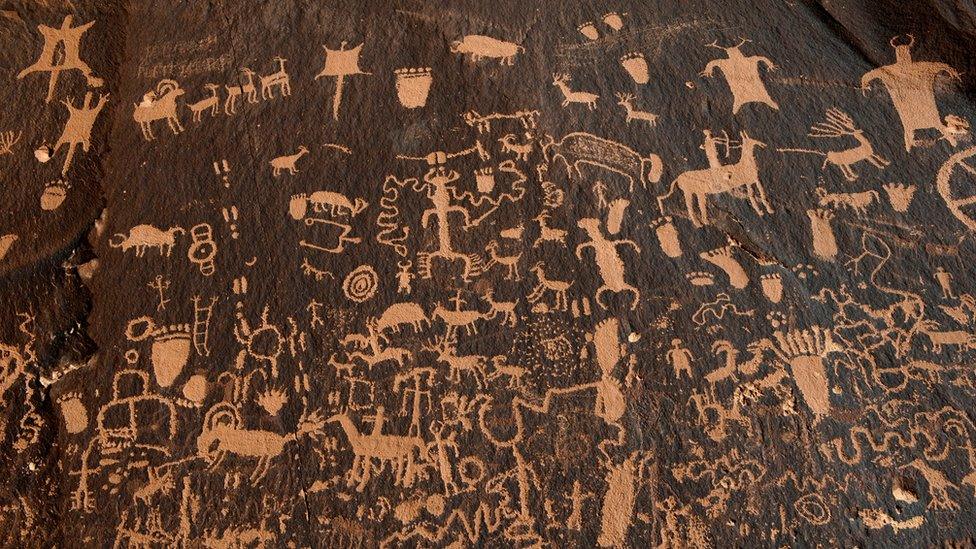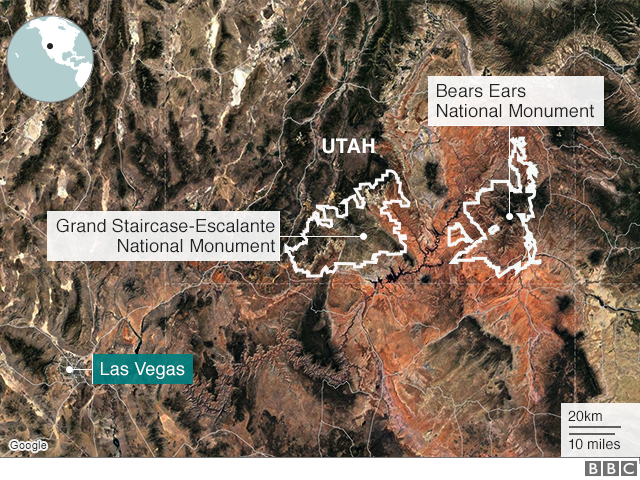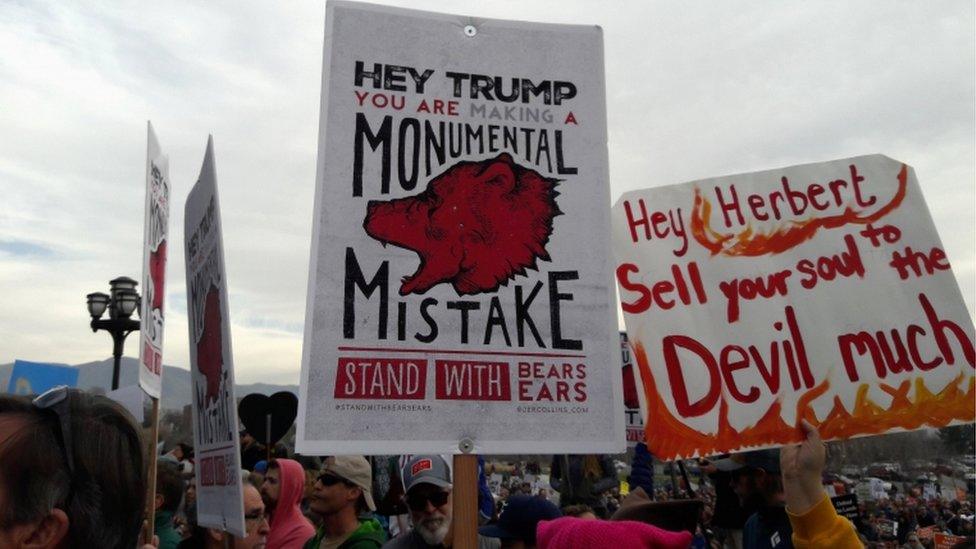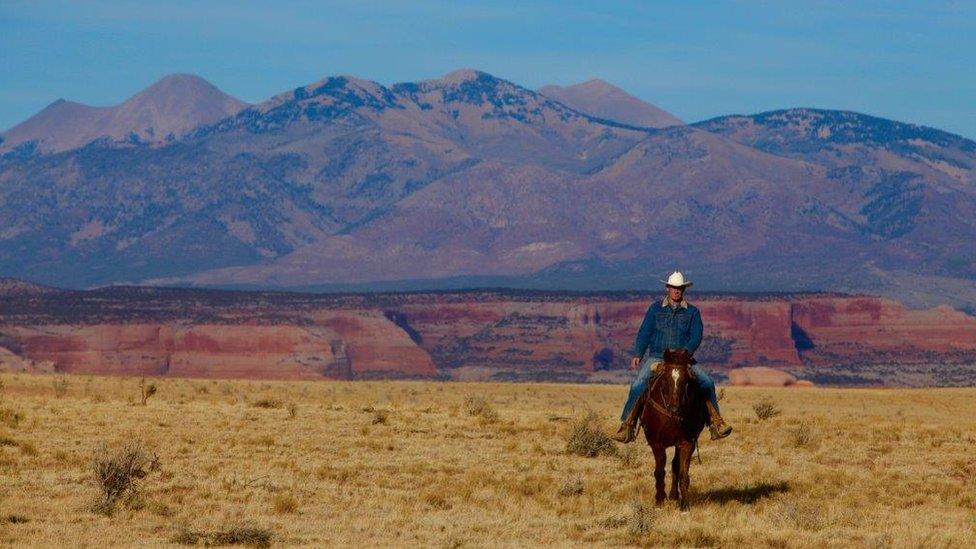Trump shrinks Utah monuments angering environmentalists
- Published

President Donald Trump has dramatically scaled back two public outdoor parks, or national monuments, in Utah.
He declared an 85% cut to the state's 1.3m acre Bears Ears National Monument and a 50% cut to its 1.9m acre Grand Staircase-Escalante National Monument.
Native American tribes and environmental groups say they will file lawsuits against the policy.
But it will be welcomed by ranchers and business interests who view such monuments as federal land grabs.
Speaking in the capitol building in Salt Lake City, Mr Trump said: "Some people think the natural resources of Utah should be controlled by a small handful of very distant bureaucrats located in Washington.
"And guess what, they're wrong," Mr Trump said.
He said former presidents had "severely abused" the law by declaring swathes of territory off limits to drilling, mining, grazing, road traffic and other activities.
Is Trump threatening the US wilderness?
Mr Trump said: "I've come to Utah to take a very historic action, to reverse federal over-reach and to restore the rights of this land to your citizens."
During his visit to Utah, the president does not plan to visit either scenic area, White House officials say.
Environmental groups reacted angrily to Mr Trump's announcement. "This is a shameful and illegal attack on our nation's protected lands", said Jamie Clark, the chief executive of Defenders of Wildlife, a non-profit organisation.
"It's not surprising that the Trump administration moved to sell out our national monuments. What is surprising is that they seem to think they can get away with it. We'll be seeing President Trump in court", he said.

Environmental campaign group Friends of the Earth said: "Public lands are to be managed for the public, not plundered by private interests that want to make billions off public resources. This action is unprecedented and will end up in court."
Outdoor clothing company Patagonia have also said they will take legal action. On Monday night, a message on their website said: "The President Stole Your Land. This is the largest elimination of protected land in American history."
Native American tribes people who consider Bears Ears sacred are also planning to sue the administration.
"We will be fighting back immediately," said Natalie Landreth, a lawyer for the Native American Rights Fund.
"All five tribes will be standing together united to defend Bears Ears."
The Navajo, Hopi, Pueblo of Zuni, Ute Mountain and Ute Indians form a commission that administrates the territory, which is rich in cultural antiquities and Native American ruins.
Jonathan Nez, Vice-President of the Navajo Nation, said: "This is a sad day for indigenous people and for America.
Allow X content?
This article contains content provided by X. We ask for your permission before anything is loaded, as they may be using cookies and other technologies. You may want to read X’s cookie policy, external and privacy policy, external before accepting. To view this content choose ‘accept and continue’.
"However, we are resilient and refuse to allow President Trump's unlawful decision to discourage us.
"We will continue to fight in honour of our ancestral warriors who fought for our way of life, for our culture and for our land, too."
On Saturday thousands of protesters - including Native Americans dressed in ceremonial headdresses - rallied in Salt Lake City against Mr Trump's action.

Mr Trump's Secretary of the Interior, Ryan Zinke, said earlier that the president's aim in reversing the park's federally protected status was "about giving rural America a voice".
He added that "public land is for the public to use and not special interests".
Bear Ears National Monument was declared by President Barack Obama in December 2016, near to the end of his presidency.
Unlike a national park, which requires an act of Congress, a national monument can be designated by any sitting president under the 1906 Antiquities Act.

Old controversies stirred up again
Analysis by James Cook, BBC News, Salt Lake City
In the United States, the struggle for control between Washington and the West is not quite as old as the hills but it goes back a long, long way.
Resentment of the federal government runs deep in many states, not least in Utah, with its majority Mormon population.
Tens of thousands of members of the Church of Jesus Christ of Latter-day Saints settled here after being driven out of Ohio, Missouri and Illinois.
The land was not empty. Archaeologists estimate that Native Americans had been living here for perhaps 12,000 years.
And what a place to live. This is some of the most stunning scenery in the world, with towering red rock formations and dramatic canyons, juniper forests and pungent sage brush.
No wonder it stirs the emotions and provokes debate.
Should the Mormons who settled here be able to farm on this land? Should corporations be allowed to drill and mine?
Should it remain a sacred site for the exclusive use of Native Americans? Or should it be a common treasury for everyone to share?
Should the federal government steward this land or should states take the lead?
Far from solving these controversies, President Trump's announcement has stirred them anew.
- Published4 December 2017
